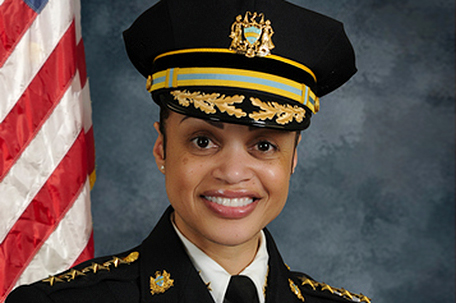
Police Commissioner Danielle Outlaw believes she can handle the pressures of overseeing the Philadelphia Police Department, even if some have questioned her fitness for the job.
By Denise Clay-Murray
If you’ve ever traveled through the Olney Transportation Center at Broad and Olney Streets here in Philadelphia, you know that it’s a busy spot that has a fairly robust police presence.
So, it came as a shock to everyone when shots rang out at the SEPTA hub on Wednesday afternoon at a time when children would be coming home from school if a global pandemic hadn’t taken all learning digital. Eight people ranging in age from 17 to 71 were injured in the shooting, one of them critically, according to Philadelphia police officials.
In 2020, nearly 500 Philadelphians were killed due to gun violence. The number of people shot was in the thousands. Demands for an increased police presence have been high in the areas where these murders seem to be occurring.
But, as the shooting at Broad and Olney proved, police presence isn’t always enough, said Danielle Outlaw, Philadelphia’s police commissioner.
“I think it’s very telling that folks that are willing to engage in these shootings are becoming more and more emboldened regardless of whether or not they see us out here,” Outlaw said. “It happened in the afternoon. It happened in broad daylight.”
Incidents like this won’t take the spotlight off of what’s been an ongoing problem for the City of Philadelphia despite most residents being in some form of quarantine due to the COVID-19 pandemic. And much of the spotlight has been on Outlaw, the first Black woman to occupy the commissioner’s office.
Outlaw’s also been in the spotlight due to her response to anti-police brutality protests following the death of George Floyd in Minneapolis.
In January, City Controller Rebecca Rhynhart released a report that accused city officials of poor planning for the unrest, giving preferential treatment to pro-police protesters and the inappropriate deployment of tear gas. Deputy Police Commissioner Dennis Wilson was demoted due to the incident, but since Outlaw gave the okay to use the tear gas, activists have been calling for her resignation.
Because of this, a group of women, many of them Outlaw’s Alpha Kappa Alpha sorority sisters, held what they called a “Sister Circle” in support of the embattled commissioner.
The women called for some understanding of the commissioner and the circumstances she’s walked into.
“It isn’t easy being first,” said Evelyn Sample-Oates, chief of family and community engagement for the School District of Philadelphia. “Especially when you’re a Black woman.”
“No one can do this alone,” said the Rev. Dr. Lorina Marshall-Blake, president of the Independence Blue Cross Foundation. “No one has served under the circumstances she has. You can’t make a fair assessment of her progress unless you consider the [COVID-19] pandemic.”
The ladies called for Philadelphians, especially Mayor Jim Kenney, to show Outlaw more support, something that activists have dismissed as a group of Philadelphia’s Black elites attempting to protect one of their own.
Add this to the revisions that voters approved to the Citizens Police Police Oversight Commission in November, the 5% “accountability bonus” that the Fraternal Order of Police are asking for as part of their upcoming contract, and Outlaw’s plate appears to be filled to overflowing.
The SUN spoke with Outlaw via Zoom and asked her about her first year as Philadelphia’s top cop, the adjustments the Oakland, California native has had to make to connect with Philadelphians, and how she plans to adjust to the fact that she will surely be a campaign issue in the upcoming race to succeed Kenney in the mayor’s office.
SUN: Thank you for the time today, Commissioner Outlaw. I guess my first question for you is, and I’m asking this because I haven’t seen it anywhere, what made you decide to apply for the job of Police Commissioner here and what did you know about Philadelphia and Philadelphians before you came here?
CO: Generally, in these positions, when there are vacancies, those folks who are doing the search, they call you, and one, let you know that the position is open, and ask if you’re interested. For me, I was very intentional about the positions I threw my name in the hat for because I didn’t want them to be able to use me, and this is for any executive search firm, right? They use you and say ‘Hey, look! I have a diverse candidate pool!’, but they already know who they’re going to hire, for the sake of saying that they have diversity.
So, I looked very intentionally at what they were seeking to accomplish. I do have family here. Not a lot of my family, but I do have family here. And so, given that a lot of the focus was on reform, I knew that there had been issues around a lot of the ‘isms’, you know, as they related to gender harassment and discrimination, crime, obviously violent crime was an issue as well. But I knew with my skill set that I could make a contribution and really add value to the work that was being done here.
SUN: What would you say has been your biggest challenge in your first year here? What was the biggest adjustment you had to make?
CO: Pick one! I mean, you know…I moved from — so again, I’m from Oakland. And a lot of folks think that the culture on the West Coast is all the same. It’s not. California is very different from Oregon or the Pacific Northwest, so there was an adjustment there. And the culture there…it’s like a passive-aggressive culture, so to speak. I had to get used to that. Whereas, you know, from the Bay or, you know, from Oakland, you just say it for what it is. No love lost and we just keep it moving. But everyone’s really down to earth, you know, really grounded, and it is what it is. And you come here, and I’ve just learned very quickly that culturally, folks here in Philadelphia are very parochial. If you’re an outsider coming into the city, it might take a little bit for folks to finally accept you as a true Philadelphian. So, working within that right off the bat, I think that was something that was eye opening because I was being questioned before I even set foot here, when I was announced.
I think the pandemic is an obvious one, and all of the things we had to do to adjust to that. And, then quite frankly, I was shocked. I traveled here often, whether it was for work, or personally. But I didn’t spend long, long periods of time here to really let it all sink in. I was shocked at how siloed, or even segregated parts of the city was by neighborhood. And again, I’m not saying…there’s one thing to be proud of…You know, I’m from East Oakland. You’re proud to be from East Oakland, right? You all claim your part of the city in some form or fashion. But here, it was a bit further to see just historically how the city was so divided just demographically. And ensuring that we have to tailor, I wouldn’t even say our crime approaches because that’s anywhere. I mean, there’s just different community expectations depending on the neighborhood you’re in. And that’s because historically who’s lived in those neighborhoods and the expectations around the services that they get, and so on and so forth. That really kind of surprised me.
And then, quite frankly, I didn’t expect to walk into a budget deficit. So, not only has policing changed, and the expectations of how we police….policing of today — or for dang sure 2020 — is not the same as even a year or two years ago, let alone three, four or five. And then to come in with a budget deficit and having to identify budget cuts and now as the budget cycle is coming up again and having to identify budget cuts, you know, it makes it difficult for us to do our jobs. When on the other hand, we’re being asked to do more. To have more visibility. To have more resources. To implement more training. All of these things that require investment. Some of those obviously were unexpected because of the pandemic. But I think also too, given what we saw during the summer, law enforcement everywhere now has to hit the reset button in how we address crime, in how we respond to civil unrest, in being more intentional with trying to identify those within our ranks, whether sworn or non-sworn, that adhere to an extreme ideology on either side. You know, it might not have been present when we first hired them, but how are we tracking them as they matriculate through their careers to be able to identify smoke before it’s fire. I mean, there’s so many things that we find now in law enforcement that we have to adapt to. And it’s not just me being in a new place. I think it’s law enforcement leaders all over the country, quite frankly.
SUN: It’s funny that you mention resources and policing and even accountability when it comes to how policing has changed over the years. I was checking out a story on the police contract, and some of the things that they’re asking for. The thing that stood out to me was a 5% accountability bonus. What has your relationship been like with the FOP, and because I’m sure you saw the same story, what did you think?
CO: I was actually surprised at that one. I was really surprised to ask for an incentive for carrying a piece of equipment. That’s like asking for an incentive for a pen or whatever. It’s part of our uniform.
I would like our communication to be stronger moving forward into 2021. And I want to be very clear, I’m not against representation by any means. The first time I went in my entire career without representation was in 2017 when I became a police chief, so even all the way up through deputy chief, even though it was a separate union for management, I had representation, I understand that they have a job to do. But with that said, there’s also management rights as well and we need to be able to do our jobs. And we all can achieve our goal together by making sure we’re on the same page. We can agree to disagree, but we have to communicate and have very strong communication to ensure that we’re achieving our goal. So, I was actually kind of surprised to see that as well. Our rank-and-file work really hard. I think we should incentivize around areas of health and wellness. I think we need to focus on policy and writing any contract to ensure accountability. To ensure that there’s community input. But to also ensure that we are shaping our culture from that of a disciplinary culture to one of performance, so that we’re actually rewarding performance. Positive, peak, optimal performance — the things that we want to see and those that go above and beyond. So I’m hoping as we move forward in our negotiations that we get to that place. I hope that we can. I think I was as shocked to see that as a lot of other folks were.
SUN: As part of the most recent elections, the city passed a charter change that would create a Citizens Police Commission that would be different from the current police commission in that it would have subpoena power and that it would be overseen by council rather than the mayor. Have you thought about how you’re going to work with that group once it’s online? What did you know about the particular charter change before it came up? Did you talk to folks in the community about it?
CO: I’d spoken to some folks in the community about it. And quite frankly, it’s not surprising to me. I come from that world. Now, I come from a couple of different structures, but in my previous lives whether in Oakland or in Portland, there was some form of community oversight and frankly, it’s the way of the world. It’s the direction in which policing is going. We have to work together. We know that in order to be seen as legitimate in the communities that we serve, we get the authority to do our jobs from the community. Traditionally for some, it may be hard to — I don’t want to say ‘let go’ of some of the power and control we traditionally had in policing — but this essentially is how it all began. I do believe that there needs to be parameters, however, because I still need to be able to do my job and have some teeth when I do my job. But, it’s the way of the future and the way of the world. I don’t have all of the details yet. I’m looking forward to seeing how this will play out and what their role would be as it relates to leadership here, but it’s been a sign of the times for years.
SUN: One of the big challenges we have — and it’s really weird that this has happened despite the fact that we’re all supposed to be quarantining in a pandemic — we had nearly 500 murders last year. To be honest, I’ve been writing about this long enough to know that this isn’t the first time we’ve had this many murders. But every time it seems like we’re getting it under control, it bursts back out again. It also seems to be picking up this year.
What do we do about it? Have you thought about what can be changed to fix this?
CO: All the time! I mean, even before I got here. And a lot of folks didn’t like the answers I was giving. And now, I think some researchers are finally starting to provide data on what a lot of us have been saying. The violent crime rate was rising well before I got here, I would even say going back to 2017. And we know in these professions that it ebbs and flows, depending on societal factors. And in this case, the steady increase was exacerbated by the pandemic illuminating all of the social inequities that folks have been talking about for years that haven’t been addressed.
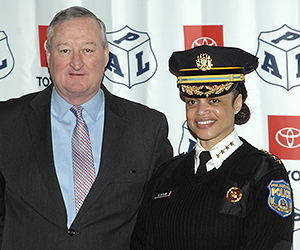
And when I say that researchers are finally bringing data to back what we’ve been saying or what I’ve been hearing, when I go to those community meetings or town halls I participate as a panelist or if there’s a focus group and I ask, ‘How do we solve this? What do we need to do?’ There’s two things that come out as it relates to the police, and quite frankly, I’m like ‘Gosh! That’s low hanging fruit!’ and it would help us in terms of establishing relationships and getting more witnesses to come forward. And it all centers around establishing and maintaining trust. And I hear ‘You guys need to know how to talk to people!’ ‘Improve your customer service, and you need to know who your folks are in your neighborhoods.’ And then, it goes to [that] we need housing, education, life skills, literacy skills — all of the social determinants that we see lend to poverty and therefore the violent crime that we’ve been seeing. Until those things are addressed, we on the police end are going to continue to fill this cup with a hole in the bottom of it.
It’s a revolving door because the root causes of the issue here have not been solidly addressed. So in my role since I’ve been here, I’ve used my seat at the table to not only manage expectations and remind folks that we cannot arrest our way out of this situation, but letting folks know that everybody has to have not only a seat at the table, but they have to use their seat at the table so that we can look at this comprehensively.
When we talk about a public health approach, how are we engaging our public health partners? How are we engaging our partners at the local, state and federal levels? How are elected officials also engaging at the legislative level, state and federal levels to either affect or impact legislation, whether it’s around gun laws, or whatever it is? How are local ordinances being used to either help further the police and what we’re trying to do or maybe even hinder?
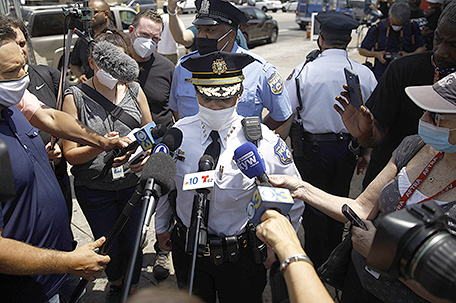
Quite frankly, there are some folks that are calling on us to stop all quality-of-life enforcement. And we know that when we cease or decrease the amount of quality of life stops that we do, the trend line goes in the opposite way and the crime and the shootings go up. There’s also folks that want us to stop all vehicle code enforcement. So, which is it?
Policing is changing, and we all want to contribute to making sure that we do our jobs in an equitable way. But also ensuring that it’s holistic and comprehensive. But we can’t have it both ways. Defund, but yet do more. Ensure that X group of people aren’t being stopped at a disproportionate rate, which I absolutely agree with. But if the data is showing us that that same group is responsible for a lot of the crime that we’re seeing, and therefore driving the crime city wide, we have to go where the data takes us. So, we have to find some common ground, but at the same time, we all have a role to play. It cannot just be on the police, and there has to be acknowledgement that, again, our roles have changed, the expectation of how we do our jobs has changed, and we’re getting less and less resources to do it.
SUN: That kind of brings me to my next question. There’s a school of thought that says that a lot of these societal ills such as poverty and stuff could be corrected if we didn’t spend as much money on policing. But by the same token, you do need to have some sort of law enforcement when we’re dealing with a society. It’s kind of how they work.
CO: I don’t think we throw out the baby with the bathwater. That may be true later on down the road. Maybe. But it has to be a phased approach. And in order to get policing again…in order for us to hit the reset button, in order for us to retrain, in order for us to adapt and evolve, we have to invest in ourselves. And I know that the easiest thing to do is to look at our budget because we take up a very large sum of the general fund, but at the same time, maybe the answers is —and I wouldn’t want anyone to say the same thing about my budget — but maybe we look in other places and say, ‘Where do we pull from there?’ so that we can continue to invest and bolster these social services because we agree. We do need to invest in these social services. But does that mean you take it from the police? Maybe not right now. Maybe once we see the plan working, you know what I mean? But right now, today, as we see these numbers going up? We still have to continue to invest. And maybe it’s not an “either/or.” Maybe it’s an “and.” I don’t know.
SUN: You know, I don’t think that people know that there’s a plan. I say this because when I talk to people about gun violence most of the time, people act as if there’s nothing being done, which can’t be right because if that were the case, things would be much worse. Can you talk a little bit about that?
CO: For us in the law enforcement world, we’ve been trying to find ways to translate what we do into layperson’s terms. The most simplified way is, we’re going where the data takes us. Where we have the most activity, you’re going to see the most cops. But we have to be intentional about it, because we don’t have a blank checkbook and we don’t have the ability to have cops on every corner. I know that it was mentioned before, [but] with Operation Safe Streets many years ago, literally, there was a cop, visible, there, in all these hotspots around the clock. It was done on overtime, it was costly, but it wasn’t sustainable for a couple of reasons. One, because it cost money, but two, all it did was displace the crime. And so, when they knew that there was going to be a cop there, they just moved it somewhere else.
So, what we’ve done, we put out a plan in the summer, created an operating model where all of this information that was coming in left and right was centralized in one central repository. We review our shootings from the previous week —every week, every Tuesday morning — with our local, state and federal partners so we can not only ensure communication, but we also have parole and probation on board, we have the feds, the prosecutors, everybody so we can all at some point — and this is all law enforcement — we can all say that this is what we can do on our end to contribute to solving this crime and to maybe preventing the next one. And then from there, we identify those most at risk of either being an offender or a victim, quite frankly, and we refer those individuals to the Office of Violence Prevention so they can intervene from the social services standpoint.
With that said, we’ve expanded our pinpoint areas on our grids, the areas where the hotspots of crime are, we expanded those who our police presence has increased in those areas. We’ve hired analysts, intelligence analysts, to work within those grids to push out information in real time. We’ve created a police district in Kensington, because we know that the open-air drug market drives a lot of our citywide crime, so we have 38 bodies there with a chain of command and a facility there. We’ve expanded our narcotics bureau to focus, again on our East division because we know a lot of that narcotics stuff is driving the crime city wide.
So tactically, we’re actually doing a lot. And I’ve been doing what I can since I’ve gotten here to break the walls across these silos because there’s a lot of overlap between what happens on our college campuses, what happens with SEPTA, what happens on PHA properties and here in the city overall. So, bringing everyone to the table once a week not only allows us to share data and information, it also ensures that if there’s something that they can do within their area of responsibility and what deliverables they have. And also, they can make any ask that they have of us. So, there’s a lot that’s been going on, but quite frankly, I think again that everyone in the country is experiencing this. Everyone is going back to the drawing board. But what we can tell you is that even though we’re seeing what we’re seeing, we’re getting a record number of guns off the street and we’ve made a record of arrests with these illegal guns. So, there’s so many things that are factoring into what we’re seeing here, but we’re going to just keep doing what we’re doing.
SUN: I was at a sort of support rally for you last week. It was an online support rally put together by some of your sorority sisters. They were gathering because there’s been, I guess, kind of a bubbling up of folks who want to see you fired because of the crime rate, because of some of the stuff that happened at the protests this summer that involved tear gas and stuff. And felt you weren’t being treated fairly.
Do you see things that way? Do you think that Philadelphians are giving you a fair shake? And there’s a mayor’s race coming up and almost always, the police commissioner is a campaign issue. How do you intend to handle that?
CO: I do my very best to make very clear that our roles are not political positions. We’re neutral. I’m not an elected official. And I’ve noticed that, to your point — and it’s not just here, it’s everywhere, quite frankly — that police commissioners can be put on the political chopping block or used as talking points or whatever it is depending on what’s going on at the time. And they can say anything they want with no filters, because they’re political. Meanwhile, I’m going to continue to do my job to the best of my ability. There’s only one perfect being that I know of. The expectations of perfection I think are unrealistic.
Going back to your first question, like I said, before I even got here, the doubt was already cast. Before I’d even set foot here as an official resident of Philadelphia, the doubt was already cast. I never got the benefit of the doubt. There’s been a lot of comparisons between me and my predecessors, whether they were from here or not. And the factors are very different. The environment I’m working in? Very different. And quite frankly, I have a different leadership style, so don’t compare me to other leaders.
Any smart leader would take the lessons they’ve learned and adapt from them. We admit when we make mistakes. I believe that the calls for my resignation were absolutely shortsighted and, quite frankly, trendy. If you look around the country, there were a lot of chiefs that were either forced to resign. Or retired. Or there was a call for their resignation. And then, okay, now what? Now, you have an empty seat. You have to start all over again. You have instability. As opposed to saying “let’s choke through.” Women are often given these roles when things are at their worst.
I appreciate the public support. They did that on their own, and what it showed me is that there are more people in my corner than there are against me.
SUN: You’re the first Black woman to hold this job. Did that add to your sense of responsibility?
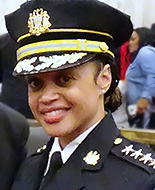
CO: Absolutely. And it wasn’t just here, it was the same thing in Portland. I was the first there, also. And there, it was, people were trying to figure it out and I had to tell folks, I’m a Black woman all day. I was born this way. I just happen to be a cop. But I’m not just the chief of police for Black people. Because when I made a decision that appeared to be in favor of [the] police, because we still have a job to do… I do my best to call balls and strikes.
The first time I was called a race traitor was there, in Portland. And then, I get here, I do bring a perspective that a lot of folks don’t bring because I have the same lived experiences. But I’m also a cop. So, I think there’s been an expectation for me to choose. ‘Are you the police, or are you a Black woman?’ And the answer is, ‘I’m both. And I can be both. It’s okay to be that way.’ So, if I feel — I don’t want to call it pressure — but I feel this sense of this expectation to choose, I can only imagine what my rank and file has been feeling for years, especially in this climate. The national narrative, the national climate, has made it difficult for a lot of us. But for me, I tell myself that if I don’t experience dissonance when these events around the country or even here are happening, if I’m not questioning if this is the profession for me and if I’m not circling back and saying ‘if not me, then who?’, then I need to stop doing this job, because I’ve either become numb or I’ve lost the ability to relate to other people’s points of view. But at the same time, I think all of the ‘isms’ that come along with being a Black woman anyway, are also an added layer to my working in this white-male dominated profession. So, all the stereotypes that come along; we’re too much, or too little. We’re too assertive or too meek, we’re educated, or we don’t know enough, we’re underqualified or we’re overqualified. All of that comes along with working in a male- dominated profession.
I think I’ve gotten where I am today just by learning to…I’ve gotten better over time at knowing it when I see it, because earlier in my career, I didn’t know. But I knew it was something that made me uncomfortable. But I just didn’t know there was a word for it. And then all of a sudden, years ago, you started hearing the term “microaggressions” and then you get a flash and say ‘So, that’s what those were!’ I knew it wasn’t a good thing, and now there’s a phrase that’s coined that we can use.
And now that we talk more about diversity, equity and inclusion, we’re raising our levels of awareness so that we can identify these things when we see them. And so, when I have people that come out and publicly speak out and address double standards clear as day here, I’m hoping that this not only opens the door for dialogue and discussion, but it really causes a lot of people to open their eyes to what they’re doing here whether it’s intentional or not.
SUN: Thank you so much, Commissioner Outlaw, for your time. I really appreciate it.
CO: Thank you.





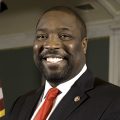

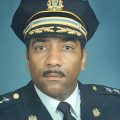









Leave a Comment